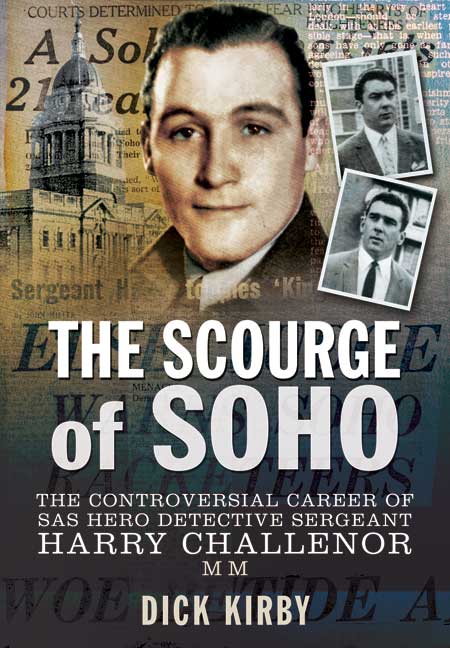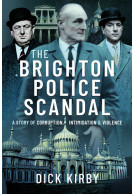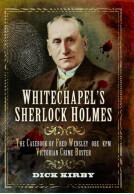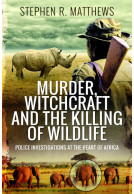The Scourge of Soho (Hardback)
The Controversial Career of SAS Hero Detective Sergeant Harry Challenor MM
Imprint: Pen & Sword True Crime
Pages: 204
ISBN: 9781781593509
Published: 27th November 2013
(click here for international delivery rates)
Order within the next 5 hours, 31 minutes to get your order processed the next working day!
Need a currency converter? Check XE.com for live rates
| Other formats available | Price |
|---|---|
| The Scourge of Soho Paperback Add to Basket | £12.99 |
| The Scourge of Soho ePub (15.0 MB) Add to Basket | £6.99 |
The Scourge of Soho describes the dramatic and eventful life of Detective Sergeant Harry Challenor MM and at the same time lifts the lid on front-line policing and the murky world of Soho criminals in the 1950s and 1960s.
Born into grinding poverty in 1922, Challenor fought with the Special Air Service during the Second World War, being parachuted behind enemy lines, captured twice, escaping twice. He was awarded the Military Medal.
Joining the post-war Metropolitan Police, challenor spent four years with the elite Flying Squad, before being sent to clear up crime in Soho. Pimps, racketeers and crooks were rounded-up and often found themselves in possession of a bewildering assortment of armaments of which they denied all knowledge. More sensible gangsters, like Reg and Ron Kray, took off as soon as his name was mentioned.
Challenor could not be frightened or bought-off, so the gang leaders put up a £1,000 reward to anyone who could frame him. In the end, it was not needed. During a political demonstration in 1963, half-bricks were planted on innocent protesters and three young policemen were imprisoned and Challenor certified as a paranoid schizophrenic and sent to a succession of psychiatric hospitals and care homes. Policeman-turned-author, Dick Kirby has interviewed former friends and colleagues of this determined but flawed character and has meticulously studied court records and official documents. The result is a sensational and gripping account of the man who became The Scourge of Soho.
As featured in the East Anglian Daily Times, Bury Mercury, Wolverhampton Magazine and Iceni Magazine.
Kirby has made an excellent attempt to remove the veneer that history has left and this is an excellent book for all those fascinated by London in the 1960s.
Paul Diggett
Every serving and retired copper has a tale to tell. Unfortunately, training and mind-set causes most of them to produce their story in a staccato and semi-official style which, although clearly relating the facts, serves mainly to cause the reader early evening drowsiness and, ultimately, disinterest!
Don Gibson
Not so with Kirby's tales. I started reading his police reports forty years ago, have now transferred my attention/allegiance to his books, and can say without fear of contradiction that his ability to turn official and rigid details into readable, interesting and 'arresting' dialogue, marks him out as one who refused to identify with other 'police' authors.
The Scourge of Soho accurately recounts events of the early 60's when strip and clip joints in the West End of London caused severe headaches to law enforcement agencies, and financial embarrassment to the gullible customers who innocently crossed their thresh-holds. Legislation to halt the level of street prostitution had driven that ancient profession underground and encouraged the increase of premises that young, up and coming criminals, quickly identified as soft targets for 'protection insurance'.
The arrival at West End Central Police Station of ex SAS soldier Harry Challoner MM soon signalled that the situation was under control. Senior 'Yard' officers nodded approval, the growth of local emerging criminal gangs was contained, and those notorious felons from neighbouring districts who sought to expand their empires were quickly frightened off.
But without adequate supervision Challoner's one man war against crime soon turned sour and events surrounding the arrival in this country of Queen Frederika took a turn which led to unlawful arrests, planting of evidence, embarrassment to Police and a full Government backed enquiry. Challoner's downfall was now complete.
Kirby writes accurately and compellingly, his research into events of half a century ago shows great perception and in-depth investigation. Those who lived through that period, or are researching the Soho of the mid 20th century, or who simply want a good read, should look no further. Here you will find all you need.
Dick Kirby has courageously tackled yet another dangerous and delicate subject in ‘The Scourge of Soho’. This accomplished author grows in stature by venturing where others fear to tread. In 1963, Parliament, the public and the judiciary expected the police to ‘keep the lid’ on an increasingly alarming section of the public hell bent on making their political views known, reinforcing their opinion with violence where necessary. The ‘Establishment’ was not amused.
Ed Williams
Taken in isolation, the distressing case of Detective Sergeant Harry Challenor, is simply the history of yet another corrupt cop, waved ‘goodbye’ by the then police hierarchy when his dirty deeds were exposed and Challenor was arrested. Kirby skillfully pulls aside the historic tapestry of the 1960’s, revealing the background to Harry’s downfall, and it is not a pretty sight. In the mind of the establishment, it was the duty of the police to deal with the ragbag collection of political dissidents marring the 1963 state visit of the King and Queen of Greece to the United Kingdom. ‘Stop the threat at any cost’ was the clarion call, a command that war-hero Harry could not turn a deaf ear to. Challenor’s CID contemporaries have, with their own insights into Harry Challenor’s downfall, helped Dick Kirby to penetrate the myths in his search for the true story.
By placing Challenor back in his crime and drug ridden post-war Soho environment, Kirby endeavours to reveal the true extent of the tragedy which drove Challenor to take suicidal shortcuts in order to ‘solve’ crime and political disorder problems on his patch of London. Burdened by an overwhelming sense of duty, haunted by the ghosts of his war hero comrades, Harry Challenor believed that the Second World War field of conflict was now located in Soho and that he was the man called to lead the troops in hand-to-hand combat. And the troops followed.
When casualties were counted, three young detectives had fallen victim to Harry’s deluded strategy of ‘planting’ evidence– they went to prison. Harry, diagnosed as paranoid schizophrenic, saw his reputation and glittering career turned to ashes. Kirby’s message is clear: do not judge Harry Challenor by the standards prevailing today. Look, if you dare, behind the tapestry at the rot and corruption in 1960’s Soho. Kirby takes the reader firmly by the hand, through the labyrinth of facts and opinion, until eventually we emerge, wiser, perhaps less critical of Harry and his CID colleagues and sharing an understanding with the author that the dubious policing methods of that era, however noble the cause, simply had to change. Every serving and would-be police officer should read and mark well the lessons of this story, brilliantly brought into the spotlight by this highly respected author.
Kirby is a master storyteller and writes with the insight and knowledge gained over his long career as a policeman. [The story is] compelling, at times chilling and one in which you can easily find yourself taking sides. It has many layers and many commendable aspects, including impeccable research, interviews and documentation and is written in Kirby’s delightful, conversational style – proving that a factual book on a heavyweight topic does not have to be heavy going. All-in-all, 194 pages of excellence. Highly recommended.
Police Collector's Memorabilia Club
About Dick Kirby
Dick Kirby was born in the East End of London and joined the Metropolitan Police in 1967. Half of his twenty-six years’ service was spent with Scotland Yard’s Serious Crime Squad and the Flying Squad.
Kirby contributes to newspapers and magazines on a regular basis, as well as appearing on television and radio. The Guv’nors, The Sweeney, Scotland Yard’s Ghost Squad, Brave Blue Line, Death on the Beat, Scourge of Soho, Scotland Yard’s Flying Squad, London’s Gangs at War, Scotland Yard’s Gangbuster, The Mayfair Mafia, Scotland Yard’s Murder Squad, Racetrack Gangs, IRA Terror on Britain’s Streets, Scotland Yard’s Casebook of Serious Crime, The Brighton Police Scandal and Missing Presumed Murdered are all published under the Wharncliffe True Crime imprint and he has further other published works to his credit. On retirement he lives near Bury St Edmunds, Suffolk. Kirby can be visited at his website: www.dickkirby.com.




















